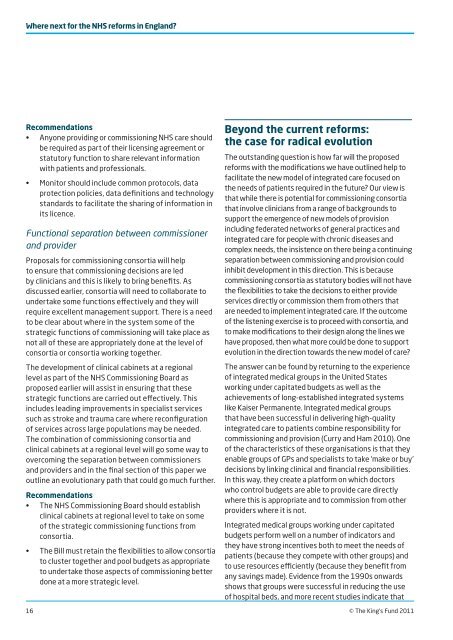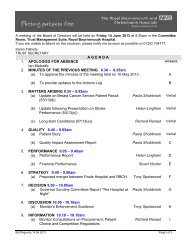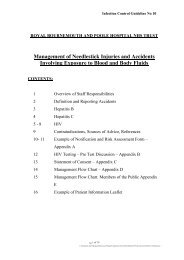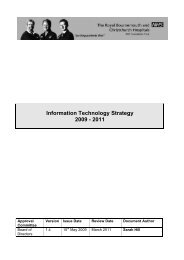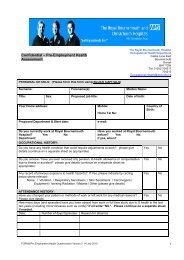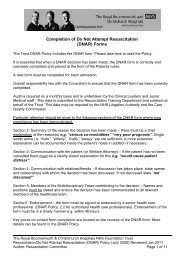View June's Board Pack - Royal Bournemouth Hospital
View June's Board Pack - Royal Bournemouth Hospital
View June's Board Pack - Royal Bournemouth Hospital
- No tags were found...
Create successful ePaper yourself
Turn your PDF publications into a flip-book with our unique Google optimized e-Paper software.
Where next for the NHS reforms in England?Recommendations• Anyone providing or commissioning NHS care shouldbe required as part of their licensing agreement orstatutory function to share relevant informationwith patients and professionals.• Monitor should include common protocols, dataprotection policies, data definitions and technologystandards to facilitate the sharing of information inits licence.Functional separation between commissionerand providerProposals for commissioning consortia will helpto ensure that commissioning decisions are ledby clinicians and this is likely to bring benefits. Asdiscussed earlier, consortia will need to collaborate toundertake some functions effectively and they willrequire excellent management support. There is a needto be clear about where in the system some of thestrategic functions of commissioning will take place asnot all of these are appropriately done at the level ofconsortia or consortia working together.The development of clinical cabinets at a regionallevel as part of the NHS Commissioning <strong>Board</strong> asproposed earlier will assist in ensuring that thesestrategic functions are carried out effectively. Thisincludes leading improvements in specialist servicessuch as stroke and trauma care where reconfigurationof services across large populations may be needed.The combination of commissioning consortia andclinical cabinets at a regional level will go some way toovercoming the separation between commissionersand providers and in the final section of this paper weoutline an evolutionary path that could go much further.Recommendations• The NHS Commissioning <strong>Board</strong> should establishclinical cabinets at regional level to take on someof the strategic commissioning functions fromconsortia.• The Bill must retain the flexibilities to allow consortiato cluster together and pool budgets as appropriateto undertake those aspects of commissioning betterdone at a more strategic level.Beyond the current reforms:the case for radical evolutionThe outstanding question is how far will the proposedreforms with the modifications we have outlined help tofacilitate the new model of integrated care focused onthe needs of patients required in the future? Our view isthat while there is potential for commissioning consortiathat involve clinicians from a range of backgrounds tosupport the emergence of new models of provisionincluding federated networks of general practices andintegrated care for people with chronic diseases andcomplex needs, the insistence on there being a continuingseparation between commissioning and provision couldinhibit development in this direction. This is becausecommissioning consortia as statutory bodies will not havethe flexibilities to take the decisions to either provideservices directly or commission them from others thatare needed to implement integrated care. If the outcomeof the listening exercise is to proceed with consortia, andto make modifications to their design along the lines wehave proposed, then what more could be done to supportevolution in the direction towards the new model of care?The answer can be found by returning to the experienceof integrated medical groups in the United Statesworking under capitated budgets as well as theachievements of long-established integrated systemslike Kaiser Permanente. Integrated medical groupsthat have been successful in delivering high-qualityintegrated care to patients combine responsibility forcommissioning and provision (Curry and Ham 2010). Oneof the characteristics of these organisations is that theyenable groups of GPs and specialists to take ‘make or buy’decisions by linking clinical and financial responsibilities.In this way, they create a platform on which doctorswho control budgets are able to provide care directlywhere this is appropriate and to commission from otherproviders where it is not.Integrated medical groups working under capitatedbudgets perform well on a number of indicators andthey have strong incentives both to meet the needs ofpatients (because they compete with other groups) andto use resources efficiently (because they benefit fromany savings made). Evidence from the 1990s onwardsshows that groups were successful in reducing the useof hospital beds, and more recent studies indicate that16 © The King’s Fund 2011


